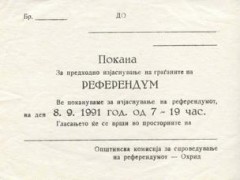Yearning for Yugoslavia

Independent Macedonia was established 22 years ago. I was 10 years old that year in 1991, when on the 8 of September around 12 pm my parents took me to the national gathering in the city square “Marshal Tito” in Skopje to celebrate the results of that day’s referendum in favour of Macedonia’s independence. I was young, but I still remember the excitement, the enthusiasm and the pride that overwhelmed all of us in the square. The national idea so often discussed in my home had finally become a reality. The new state realized the national dreams of the Macedonian people, and I was aware even then that I was witnessing a unique moment in history.

The invitation to the 8 September 1991 referendum, the most important event in recent Macedonian history. Photo available under CC BY-SA.
However, national fulfillment has been probably about all that moment really delivered. The agonizing transition from Yugoslavian market socialism to the “Macedonian” open market drained away all the excitement for the majority of people. The adolescence of everyone in my generation was filled with stories about factories going broke and workers being laid off. The new state offered neither the economic nor the social security the older generation once had.
I remember the Yugoslav times as times when it was safe to walk in the street. Times when we didn’t lock our doors. No one would rob you or knock you down in the streets. Friends visited each other without first having to check their diaries. The Federation was based on a unique brand of market socialism and workers’ self-management. Through workers’ councils the workers managed production and distribution of profits and the main beneficiaries of the distribution process were the workers themselves. Economic reforms brought a growing economy, high levels of employment, a strong and free education system (including higher education) and healthcare for every citizen. Unlike in other communist and socialist countries, people were free to travel, and they could afford to travel too.

Yugoslavia and the republics that were formed after its dissolution. Yugo nostalgia still unites the citizens of these states. Photo available under GNU Free Documentation License, Version 1.2.
Today, the Macedonian state is slowly recuperating from the painful transition and the situation has somewhat improved. Some jobs have been created, small new markets have emerged. The visa curtain has fallen and people can freely travel around Europe. Employment is still difficult to find, the living standard is low, but compared to former times in Yugoslavia, the new generations have many more opportunities and choices.
Yet, at the beginning of the 21st century, people still long for Yugoslavia. The generation of 22 years olds never lived in Yugoslavia, they were actually born in that year I was in the city square celebrating. They were born in the year Yugoslavia dissolved and an independent Macedonia was established.
But they still believe that life was better under the old system.
22 year old Macedonians, Serbs, Bosnians and Montenegrins share the same beliefs about the old common federation. They believe that practically everything was better back then: daily life, salaries, employment opportunities, job stability, education, health care, social justice, public safety, and so on and forth.As the European Fund for the Balkans has revealed, there is not too much difference between how the younger and older generations perceive and feel about Yugoslavia.*
This Yugo nostalgia is a strong myth which is difficult for current governments to fight. The fact that “new states” are still having a hard time to take the place of Yugoslavia in the minds of their citizens is seriously endangering relationships between Macedonia, Bosnia and Herzegovina, Serbia and Montenegro and their citizens. These states have to start delivering. Independence has long been delivered and a new social and economic system is needed to fuel their relationships with their citizens and start meeting the expectations of the people.
Citizens demand more.
*The survey was conducted in October 2011 when the “22 year olds” were actually “”20 years olds”.
Tags: 22 year olds, Bosnia-Herzegovina, independence, Macedonia, market socialism, Montenegro, Serbia, transition, Yugo nostalgia, Yugoslavia
